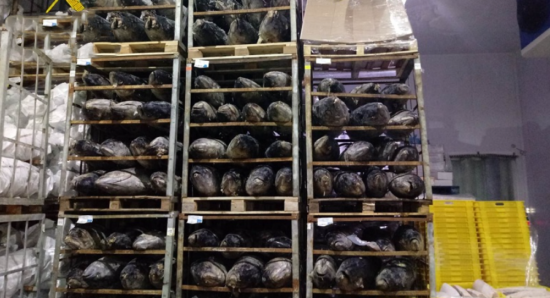45 tons of frozen tuna seized in Spain because of illegal treatment
[ 2019.08.26 ]

Spanish authorities have seized 45 tons of illegally treated tuna fish from four provinces. Four people face possible criminal penalties of up to four years in prison for endangering public health, as well as administrative sanctions.
Frozen tuna for canning had been treated with substances that enhance the color and then diverted to the market to be sold as fresh fish – quadrupling its value. Such treatment can pose a public health risk associated with allergic reactions to histamine.
Last year, a histamine outbreak sickened hundreds of people in Spain, Italy, France, Croatia and Denmark. A European Food Safety Authority (EFSA) assessment could not find one single event at a specific point in the supply chain that could be considered as the origin of all clusters of cases.
The recent Operation Atunali in Spain, led by the environmental protection service of the Spanish civil guard SEPRONA with Interpol and Europol, targeted Alicante, A Coruña, Murcia and Barcelona. The investigation uncovered three companies and three fishing vessels involved in the fraudulent scheme. The operation was begun in January by agents of SEPRONA (Servicio de Protección de la Naturaleza) from Alicante.
Initially, the Spanish civil guard (La Guardia Civil) seized 10 tons of tuna for not having the necessary traceability for commercialization. Another inspection at a different site revealed several lots of frozen yellowfin tuna, which did not have documentation on its origin or the system used for freezing it.
Seprona and the European Food Fraud Network of the European Commission found the vessels used did not meet requirements for freezing in brine after capture. The investigation is ongoing.
The EU Commission was informed in 2016 that tuna destined for canning, frozen in brine after capture at temperatures of -9 degrees C instead of -18 degrees C, was being treated with vegetable extracts containing a high concentration of nitrites to alter the color of the fish. This process enhances the perceived quality by turning the brownish color of tuna frozen in brine to a red color that consumers believe shows the freshness of the fish.
Adding nitrites to fish is not authorized and use of vegetable extracts rich in nitrites is in breach of specifications for food additives in Commission Regulation (EC) No 231/2012.
Carbon monoxide gas falls under the definition of a food additive. Treatment with it can mask spoilage by maintaining the red color of fresh fish. Fresh fish cannot be subjected to a treatment which is not scientifically recognized or formally approved.
Operation Opson VII this year, run by Interpol and Europol, looked at the issue across 11 European countries to detect fraud in tuna fish. Illicit practices included species substitution and fraudulently selling tuna intended for canning as fresh fish.
Spain, Italy, France, Germany, Portugal, The Netherlands, United Kingdom, Hungary, Liechtenstein, Norway and Switzerland were involved.



